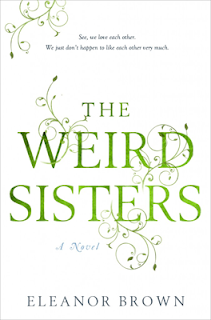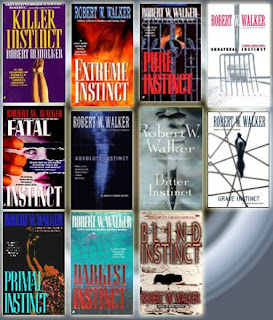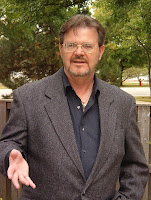There is/was/has been no more insidious word in the English language to insinuate itself on sentences like a parasitic leech than the verb to be, and in particular the word WAS.
Take a moment and picture for me a was in your head; next, define the word was in the manner you might define any action/active verb and you cannot. Picture was now in your mind and tell me what you AREWAS seeing?
Do same for throw/threw/thrown or torch/torched. Jessica bolted from her seat RATHER THAN Jessica was about to maybe stand up as she was sipping her coffee. Meredyth torched up her language whenever Lucas Stonecoat entered her office. The man enraged her. These examples “fire off” mental imagery and are far more photographic and Strong in Voice than is this: Meredyth was (in the process of) thinking about perhaps torching up her language whenever she was confronted by Lucas’s presence in her office. Lucas, by the same token, was nervously thinking about maybe entering the room. If you wish to write Passively go write speeches for politicians and supreme court justices.
AND yes Fred, go to the head of the class. One style or Voice is the point, pointed, photogenic and active, while the second lacks control, hard to determine point, less than pointed or photogenic and entirely passive and riddled with WASes that often beget more Qualifying. A storyteller who peppers his tales with qualifiers and passives cuts his own throat and is easily the example to point to in an exercise for what not to do in fiction and dramatic writing.
However, proof always (always being an absolute) in the proverbial pudding, does Robert W. Walker practice what he preaches? Take a look at these examples taken all from works in progress:
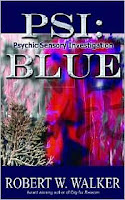 From Psi Blue:
From Psi Blue:
FBI Headquarters Secret Psychic Detection Lab modern day…
Special Agent Aurelia Murphy Hiyakawa sat clothed in a virgin white terry robe, in the lotus position, electrodes attached and grounded to the open air copper pipe pyramid, which she’d designed to enhance her psychic projections and astral journeys. A small sterile white mat lie before her, and on the mat lay six items she’d been asked to “read”. The objects held a strange communion with her. She fingered each item, tossing several out of the pyramid, holding onto other items as she went.
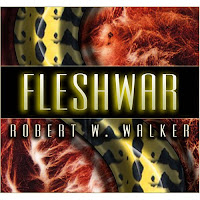 From Flesh War:
From Flesh War:
In the Bay of Bengal, India modern day…
The side-wheeler Bristol Star of India chugged into thick fog that hinted at rich sea air, with just a suggestion of the stench of the disease in the mist over the bay. The disease island must be near, must be in the vicinity. Small, sad death boats, their bottoms filled with corpses had begun to emerge from the fog to drift by the Star’s bow. Angelica Hunter gasped at the sight and grabbed Eric’s arm for support.
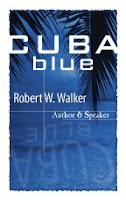 From Cuba Blue:
From Cuba Blue:
Off the coast of Havana, Cuba modern day…
The coast of Havana’s clear-blue tropical sea heard the mechanical cry of screeching rust-encrusted gears that suddenly slammed to a standstill. Several nautical miles north of Canal del Entrada, Cuba, the whining pulley ratcheted once, then twice with biting and chomping, then stopped again on the dimly-lit shrimp trawler Sanabella II. The unexpected stillness stopped all activity aboard ship and save for the screeching hungry seagulls, the deafening quiet reigned. Wide-eyed, the men, frozen in position, stared first at the choked-off windlass and then at one another afraid to breathe, afraid to hope. Fishing had been wretchedly poor.
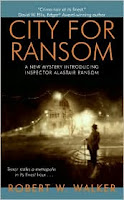 From City for Ransom:
From City for Ransom:
Chicago, Illinois, June 1, 1893…3AM
The newly formed and lettered sign tore at its chain moorings where it dangled over the modest brownstone house, the shingle reading Dr. James Phineas Tewes, Phrenological and Magnetic Examiner until a lightning strike hit it, turning it into an unrecognizable charred mess.
Across town to the sound of thunder, lightning, wind, rain, and the clock tolling 5AM, Alastair Ransom climbed from bed, unable to sleep, his skin afire with malarial fever. He dosed himself with a hefty tumbler of quinine and Kentucky whiskey. He imagined strangling Dr. Caine McKinnette for having run out of his supply of quinine and antimony. He breathed in deeply, imagining the pleasure of his hands around the good doctor’s throat. Then once more what really troubled him began invading his night: the awful, bloody murder case that had fallen into his lap the day before.
THESE ARE ALL examples of opening with the verve of strong verbs, the conscious choice of few to no qualifiers, no WASes please! And active voice. Any elementary or high school grammar text is worth revisiting to rekindle these notions into fire in a writer’s gut. It’s the little things that make a female lead compelling. Revisit Passive vs. Active Voice, the handful of pages devoted to Qualifiers vs. Absolutes (voice), and while at it, look up sentence combining for the 4 types of sentences— Simple, Compound, Complex, and Compound Complex. Imagine it, what Shakespeare utilized we all have to work with—shapes already formed, voice choice, to qualify or not to qualify, to BE or not to BE, and whether tis nobler in the mind to use a hammer blow of a two word sentence like Jesus wept, OR rather to compound it, complex it or compound complex it as in the following.
Jesus wept. (pow, zap, bang, zoom! Singe/first base)
Jesus wept, and others watched. (rings different bell in compound set)
In his sixteenth year on the planet, Jesus wept. (complex adds fragmentary)
Jesus, in his sixteenth year on the planet, wept. (introduction or interrupting fragment(ary) and we ring another kind of bell)
Now the homer of a sentence, the big boy: Compound Complex….
In his sixteenth year, Jesus wept, while from afar, others curiously watched.
(intro. Frag) S + V (intro. Frag) S + V
Each choice we make as in each choice ONE makes, as in difference between the chummy we as opposed to the formal one goes into the building blocks of the stone wall we can call our Voice for this story or this novel. Every little choice becomes a major decision, and it is for this reason many people cannot write ‘worth a flip’ because why, Fred?
Yes, a ‘lotta lotta’ people don’t do well in decision-making, and writing is really about making a thousand decisions per sentence, per paragraph, per scene, per chapter. Some stories beg to be told in a formal voice in a particular setting with specific characters, while others demand an informal voice in an entirely different setting with a host of other goals.
Not all your stories need take on the same voice, but within that single story or novel, your ONE consistent is that you be consistent and true to the voice you choose.
This essay has just slipped into the YOU approach, friendly and personalized. In multiple viewpoint novels as I do, each HEAD you speak from, each HEAD you get into and SENSE and SEE from must need have its own internal/infernal logic and consistent mindset or ‘psychology’. In other words: VOICE–the most important element of your story…..especially if you hope to make it uniquely feminine, sir…or uniquely male, madam.
Robert W. Walker
_________________
Robert W. Walker is the author of over forty novels with a record eight series heroes and heroines. His most enduring female lead is Dr. Jessica Coran of the Instinct Series and Meredyth Sanger of the Edge Series. In 2006 City for Ransom began a dual male/female lead with Dr. Jane Tewes who doubles as Dr. James Phineas Tewes in this pre-forensics 1893 Chicago setting. The sequel, Shadows in the White City won the coveted Lovey Award for best historical novel of 2007. City of the Absent followed in 2008.. Coming in 2009 Dead On from Five Star Books
“Write to your opposite” is Walker’s watchword as “this forces you into a worthwhile writing challenge. So set your stories in exotic places you’ve never been with exotic characters you’ve never known.. You’ll surprise yourself.” Robert’s website is chock full with advice and examples. Visit for the fun of it or for the lessons to be had at http://www.robertwwalkerbooks.com/

